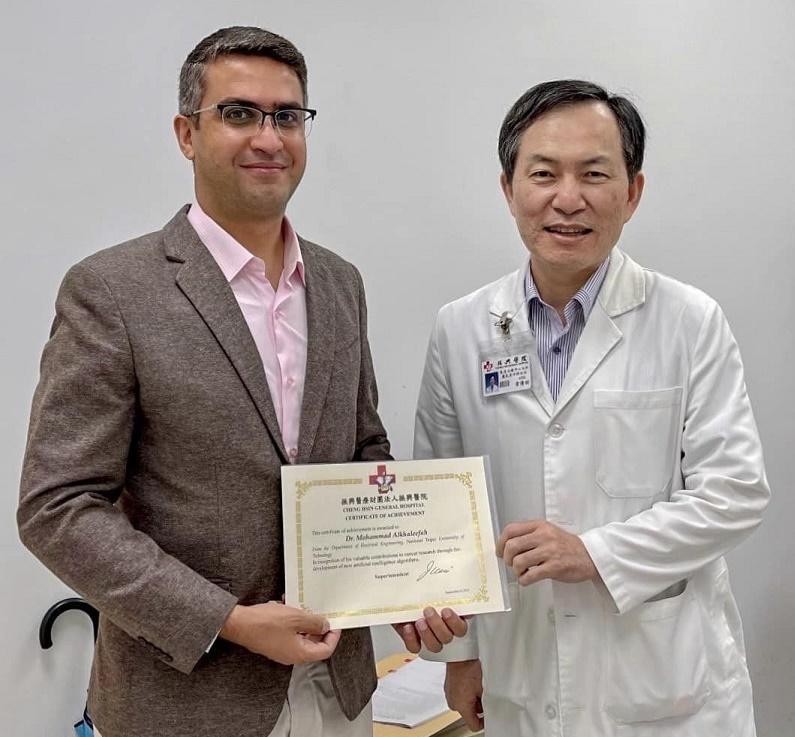AMMAN — Two Jordanian doctors were honored abroad for
their medical achievements, local news outlets reported.
اضافة اعلان
One scientist
and expert in neurodevelopmental disorders was awarded in Qatar. Dr Noraldin
Al-Deri, has developed a new device for diagnosing mental disorders, considered
the first such device for children operating via intellectual technology and
artificial intelligence, Khaberni reported.
The device is
able to accurately assess a child’s mental acuity in 6.5 minutes and identify
when children suffer from mental disorders such as autism spectrum disorder,
attention deficit hyperactivity disorder, sensory disorders, speech delays, and
motor development delays.
Qatar Foundation
supported this invention from its initial stages to the final testing. The
invention was recently chosen as one of the top seven out of 2,000 projects
submitted to the Stars of Science Competition for the MENA region.
Currently, Deri
represents Jordan in the 14th season of the competition.
The Director of
Cheng Hsin General Hospital in Taipei, Taiwan, honored Jordanian scientist Dr
Mohammad Bassam Khalifa Al-Manaseer, for developing an artificial intelligence
algorithm capable of early detection of different types of cancer, such as
liver and kidney cancer, and most recently breast cancer, according to Al-Ghad
News.
 Jordanian scientist, Dr. Mohammad Bassam Khalifa Al-Manaseer, is honored by the director of Cheng Hsin General Hospital in Taipei, Taiwan, for developing an artificial intelligence algorithm capable of early detection of different types of cancer, such as liver, kidney, and breast. (Photo: Twitter)
Jordanian scientist, Dr. Mohammad Bassam Khalifa Al-Manaseer, is honored by the director of Cheng Hsin General Hospital in Taipei, Taiwan, for developing an artificial intelligence algorithm capable of early detection of different types of cancer, such as liver, kidney, and breast. (Photo: Twitter)
Manaseer
published his last research paper on early detection of breast cancer using
deep learning in the international medical journal, called “Cancers”.
Al-Ghad said
Cancers is one of the important scientific publications in the study of
oncology, with a high impact factor.
According to
Manaseer, deep learning is one of the artificial intelligence branches that
allows the machine to learn from data analysis by itself through cells and
neural networks stimulation in the human brain.
He added that
breast cancer’s early detection by reading
X-ray images with the naked eye is
the most common method, but the presence of different types of breast tissue
makes the diagnosis process more complicated.
Deep learning,
Manaseer explained, focuses on complex computational analysis for radiographs
to recognize different patterns within the images, which usually requires
thousands of images to train the algorithm and enhance its results.
Manaseer also
pointed out that the experiments conducted on three databases of X-ray images
proved that the new artificial intelligence algorithm is capable of reading
X-ray images.
He said that the
machine can detect breast cancer within a few seconds, with more than 96
percent accuracy rate. He noted that the new algorithm reduces the results of
wrong tests, especially false negative results, with a rate of up to 4 percent.
Breast cancer is
the most common type of cancer worldwide, with approximately one in 12 women
developing breast cancer in their lifetime. It is also the first reason for
cancer death among women.
Nearly 685,000
women died from breast cancer in 2020, according to a report by the
World Health Organization.
Manaseer
said he hoped that this algorithm will help doctors and radiologists in their
work to get accurate early detection of breast cancer to speed up its treatment
and reduce the financial and psychological consequences of it, and most
importantly to reduce the cases of death resulting from it.
Read more National news
Jordan News



